Blog
August 26th, 2014
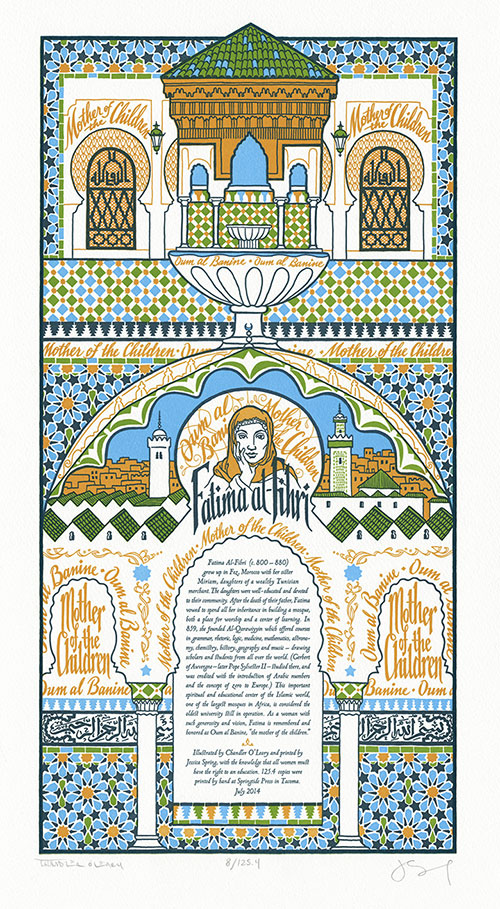
At long last, Jessica and I are ready to unveil our newest Dead Feminist broadside—a piece that has been weighing heavily on our hearts and minds. Our journey began in April, when over 200 girls were kidnapped from their school in Chibok, Nigeria. Since then the media has been filled with accusations leveled at Islam—a culture we know to have a long history of valuing education, innovation and knowledge. We also know that the danger of extremism knows no cultural boundary—and that it would benefit us all to build a world where every girl has the opportunity and security to obtain an education.
So after months of exhaustive research, we decided to go back in time to some of the earliest days of higher education, and to the life and work of Fatima al-Fihri—the woman who founded Al-Qarawiyyin, the oldest university still in operation today. Because Fatima lived in the 9th century, no direct quotes have made it to the present era. Instead, the piece highlights Fatima’s honorific title: Oum al Banine, or “Mother of the Children.”
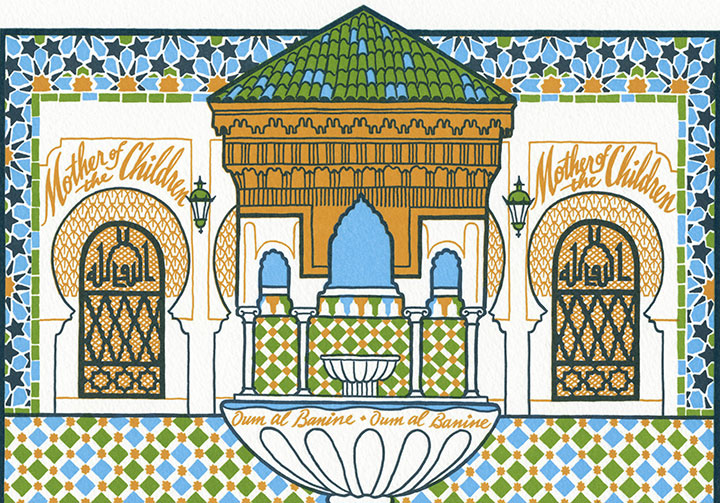
The phrase weaves through the piece like the mortar between stones, repeating again and again like a mantra. The design mirrors the Arabesque decorative style, as well as the common practice of decorating Muslim houses of worship with text (often phrases from the Qur’an). Because it is forbidden to depict the Prophet in Islam, architecture is usually adorned with text and geometric patterns instead.
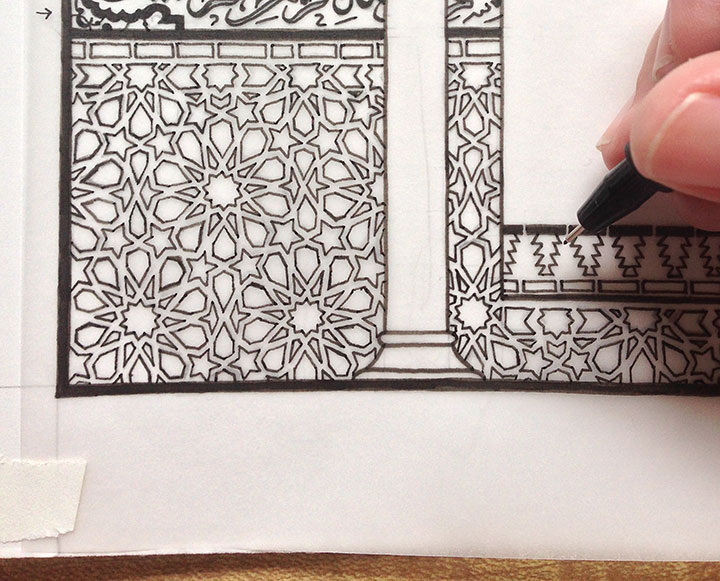
I spent a long, long time creating this illustration—not only because of all the ornate patterning, or the carefully-researched Arabic script. Not just the time I spent trying to find images of Al-Qarawiyyin, or information about Fatima’s life. Somehow, the act of creating this illustration became something of a mantra in itself. All the time required to draft these patterns and compose the page became a form of meditation—and I needed that with this piece. Because much more than that, this became an exercise in trying to understand.
I was trying to understand why we had so much trouble finding a voice for this piece. Why we had to go back 1200 years to find a woman like Fatima, who had made a lasting contribution and who was remembered. Why we could not find a relevant, direct quote at all, despite months of research and consulting scholars on this topic. Why it is so difficult and dangerous for a girl to obtain an education in so many parts of the world. Why there is so much violence and hatred and fear surrounding a belief system with so much beauty inherent within it. Why we are still asking these basic questions after so many centuries have passed.
The answers did not come with the completion of the drawing. They did not come off the press with the finished prints. They will not come through my fingers as I type this. If they cannot come as a result of war, or negotiation between heads of state, or elected office, or royal birthright, or the swell of the mob—they won’t come from me.
But I do know this: every human life is worth the same, and deserves the same chance in life. And more than anything else, I know that education, even at its most basic, is the best chance anyone can have to make a good life—for themselves, and for the rest of us. Education is the best defence we know against extremism, poverty, and violence. So this is where we begin. Where we should always begin.
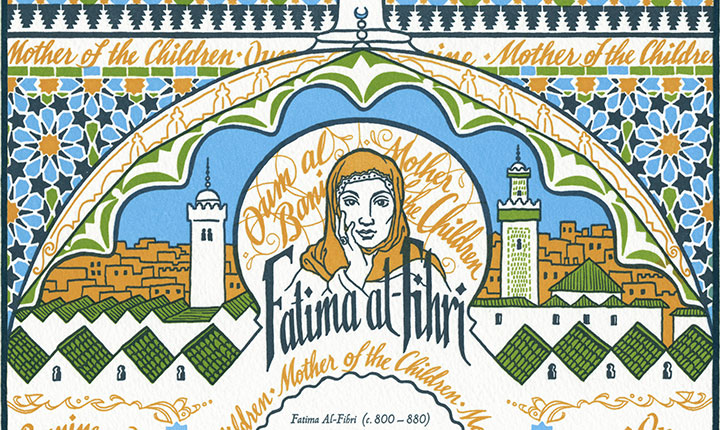
Our 20th Dead Feminist broadside is an ornate tribute to Fatima’s world and the institution she founded. The composition, structured like a Persian manuscript page, features an illustration based on the architecture of Al-Qarawiyyin, with its angular rooflines and sweeping curved arches. Interspersed thoughout the piece is a hand-drawn geometric pattern that mirrors the tilework throughout the university and mosque. Wrapping around the “walls” behind a pair of columns is the Basmala (the phrase that begins every sura or chapter of the Qur’an), lettered in Arabic script.
To help ensure the safety and quality of girls’ education worldwide, we are donating a portion of our proceeds to Girl Up — a nonprofit campaign of the United Nations Foundation that assists some of the world’s hardest-to-reach adolescent girls.
• • • • • • • • • • • • • • • • • • • • • • • • • • • • • • • • • • • • • • • • • • • • • • • • • • • • • • • • • • • •
The Veil of Knowledge: No. 20 in the Dead Feminists series
Edition size: 125.4***
Poster size: 10 x 18 inches
Printed on an antique Vandercook Universal One press, on archival, 100% rag (cotton) paper. Each piece is numbered and signed by both artists.
Colophon reads:
Fatima Al-Fihri (c. 800 – 880) grew up in Fez, Morocco with her sister Miriam, daughters of a wealthy Tunisian merchant. The daughters were well-educated and devoted to their community. After the death of their father, Fatima vowed to spend all her inheritance in building a mosque, both a place for worship and a center of learning. In 859, she founded Al-Qarawiyyin, which offered courses in grammar, rhetoric, logic, medicine, mathematics, astronomy, chemistry, history, geography and music — drawing scholars and students from all over the world. (Gerbert of Auverge — later Pope Sylvester II — studied there, and was credited with the introduction of Arabic numbers and the concept of zero to Europe.) This important spiritual and educational center of the Islamic world, one of the largest mosques in Africa, is considered the oldest university still in operation. As a woman with such generosity and vision, Fatima is remembered and honored as Oum al Banine, “the mother of the children.”
Illustrated by Chandler O’Leary and printed by Jessica Spring, with the knowledge that all women must have the right to an education.
Available now in the Dead Feminists shop!
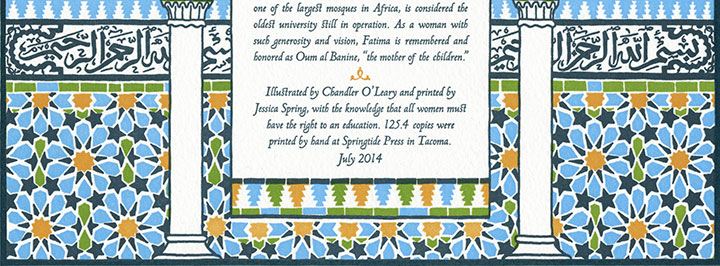
*** The edition size needs a little explanation—every broadside has a symbolic edition number, but this piece is extra special. This number is the solution to an equation we devised out of numbers that are highly symbolic in Islam. Arabic culture is credited with the invention of algebra—a term derived from an Arabic word meaning “the reunion of broken parts.” We arrived at our edition number by multiplying 66 (the number that represents Allah in Islamic numerology) by 19 (considered by some mystics to be the “Key to the Q’uran”), and then dividing the result by 10 (ten-pointed stars are common elements in Arabesque patterning, as well as our broadside design). The “.4” in our edition number represents four artist proofs that exist outside the numbered edition, and set aside as gifts for four important women in our lives. These four women mirror the four “Women of the First Rank in Islam” (Khadijah, first wife of the Prophet; Fatimah, the fourth daughter of Khadijah and the Prophet, and the wife of the Fourth Caliph; the Virgin Mary; and Asiya, wife of the pharaoh and stepmother to Moses).
August 18th, 2014
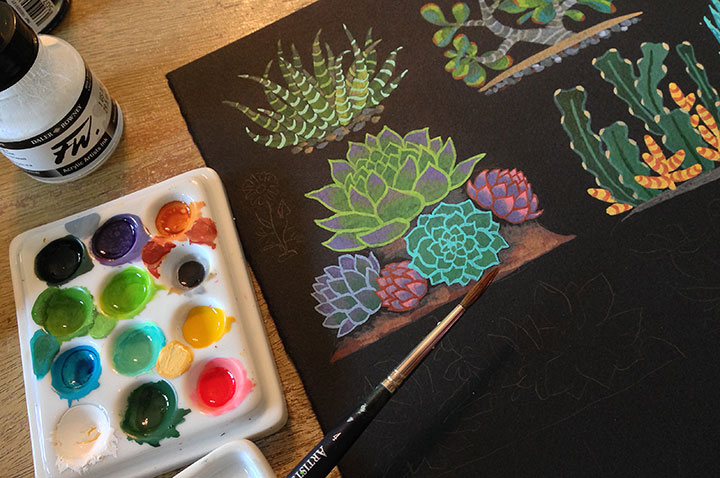
Life around here is pretty frantic this week, while I finish up a bunch of projects and get ready for new ones appearing over the horizon. Since the thought of telling you about them in coherent paragraph format gives me hives (as I can’t even wrap my own brain around them all yet!), here’s what’s going on this week, in a simple, handy-dandy list:
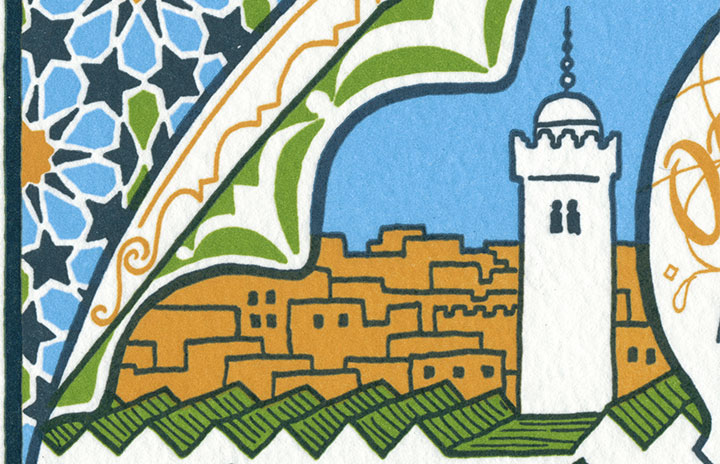
1. Jessica and I have (finally) finished printing the new Dead Feminist broadside! All the prints are signed, numbered, bagged and ready to go. All I have to do is finish writing all the things that go with it (shop copy, blog post, email newsletter, etc.)—so look for it here in the next couple of days.
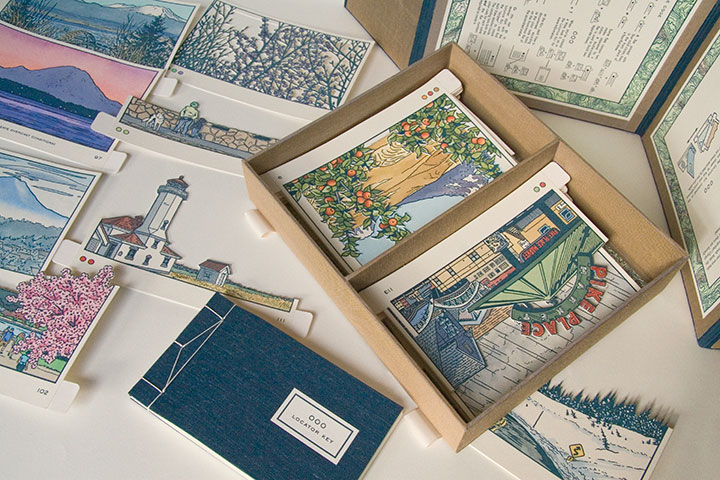
2. If you’re local, this Thursday I’ll be doing a little demo of my Local Conditions artist book at the Tacoma Art Museum. The book is currently in the Ink This! exhibit at TAM, but as it’s in a glass case, it’s not possible to actually interact with the book. So as part of the free Third Thursday activities, I’ll have my prototype copy of the book to demonstrate with, as well as a sampling of my process materials. I’ll be there from 5 to 8 on Thursday (though I’d suggest getting there closer to 5 so you don’t miss stuff!); TAM is located at 1701 Pacific Avenue in downtown Tacoma.

3. The lovely guys over at The Artist Rolls have featured me in a podcast! Jamie and Sean have a little different way of doing things for their interviews—they have each guest roll dice before each question, like you might in a role-playing game, and the results determine the course of the interview. We had a great conversation about process, the roles artists play (get it?), and the Whale of Preparedness—and they even let me draw pictures all over my data sheet. I hope you’ll have as much fun listening as we did chatting—you can stream it here, or you can download it for free from the iTunes Store. Thanks, Sean and Jamie!
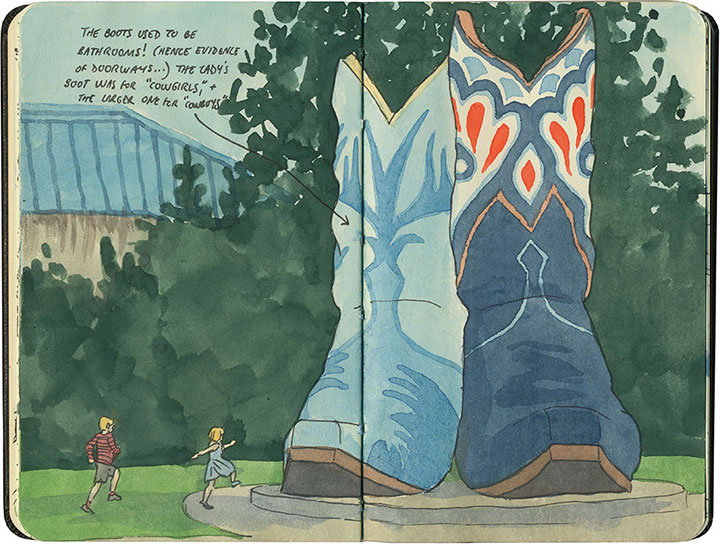
4. I’ve got a new solo exhibit opening in mid-September, at the Tacoma Public Library’s Handforth Gallery. It’s a show of my sketchbook drawings from Drawn the Road Again, with a special emphasis on roadside attractions (can you hear me cackling already?!). Look for more info here soon, but for now you can get your feet wet by reading a new series of features on the travel site Atlas Obscura. They started with an interview about Drawn the Road, and last Friday began a series of weekly features on my roadside attractions posts. Each post will go into more depth about each attraction, using my sketch(es) as a starting point. It’ll be the perfect companion to my exhibit—and a great alternative for everyone who can’t see the show in person.
Whew! That’s it for the moment…back with more soon.
July 28th, 2014
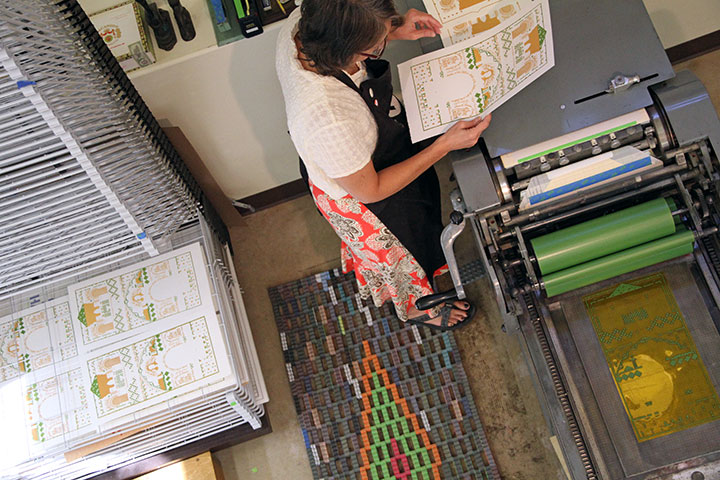
Jessica has our new broadside on press as I type this, lining up the colors and doing one last check for typos. But this week also holds another kind of “typo” for us, the kind we actually encourage: typophiles.
While our schedules prevent us from actually being there in person, I’m happy to announce that many of our Dead Feminist broadsides will be exhibited this week as part of TypeCon 2014 in Washington, DC. Since it began in 1998, TypeCon has been a major gathering point for designers, typographers and letterers—as well as a nexus for typography as an art form. So we’re incredibly excited and honored to have our work featured among so many talented artists. So if you happen to be attending TypeCon this week, stop by the gallery and take a gander—and tell everyone hi for us!
July 21st, 2014
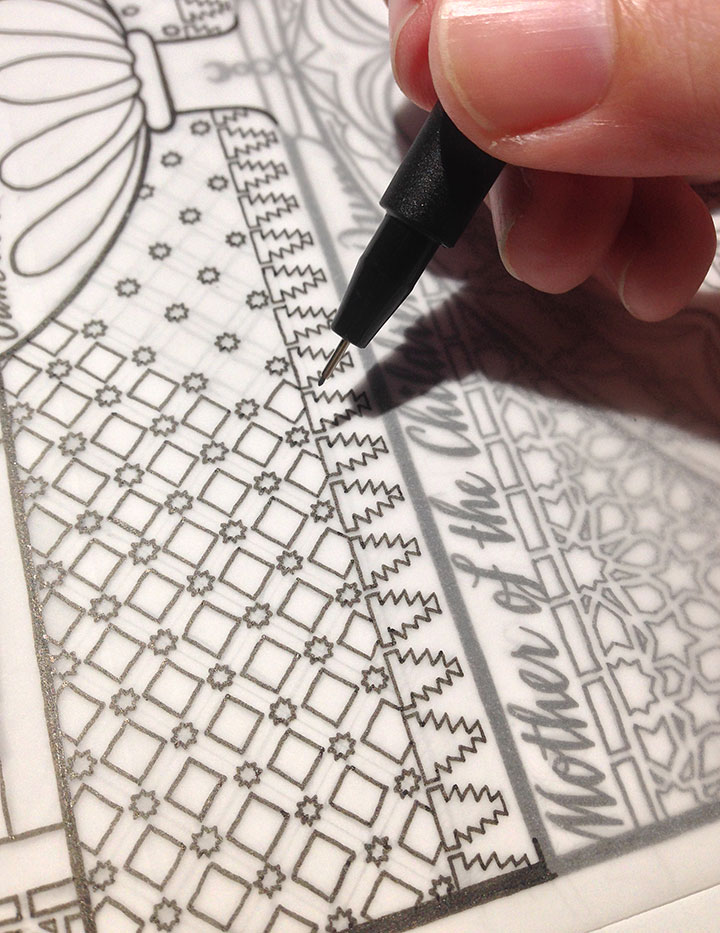
It’s that time again—Jessica and I are hard at work on the next Dead Feminist broadside. Actually, we’ve been hard at work on this piece for months already. I think it’s safe to say that this piece has the most research and labor behind it than any we’ve done so far.
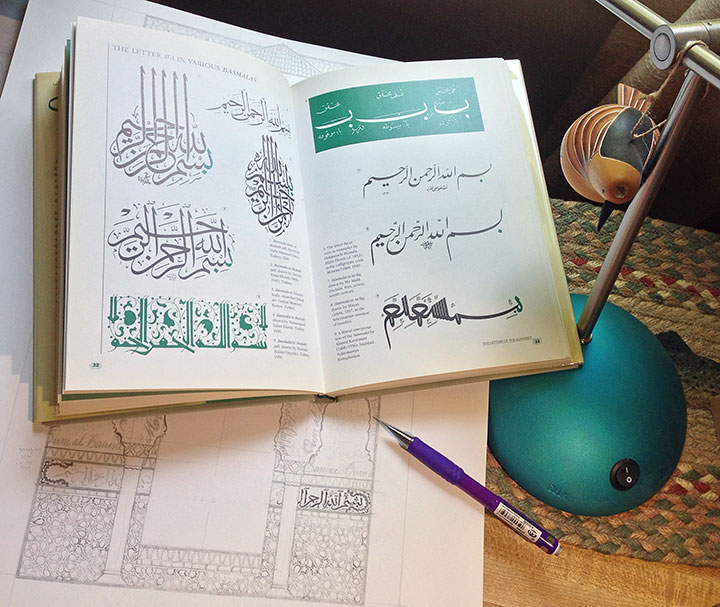
There’s a lot at stake this time, and we want to get things right. And besides—as you can see, the piece is chock full of teeny tiny bits, and the registration is going to be tight. So we’re doubling down on the proofreading skills and triple-checking every detail.
Now the design is done, I just sent out the finished files for the plates, and we’ll be on press starting this week. More soon!

July 3rd, 2014
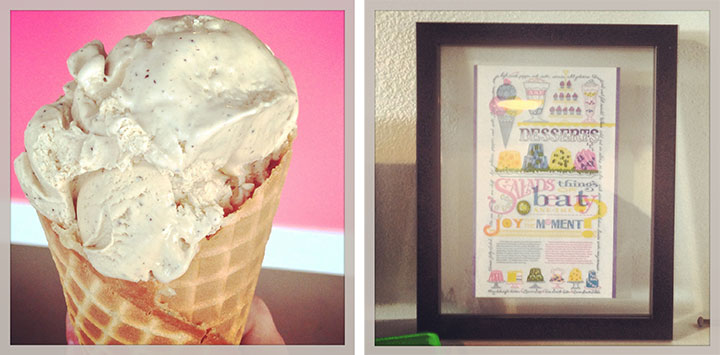
At long last, Tacoma has a real ice cream parlor—I can’t tell you how many years we’ve waited for this. Today I stood in line for the best coffee ice cream I’ve had in years, and while I waited my turn to pay, I noticed something familiar behind the counter!
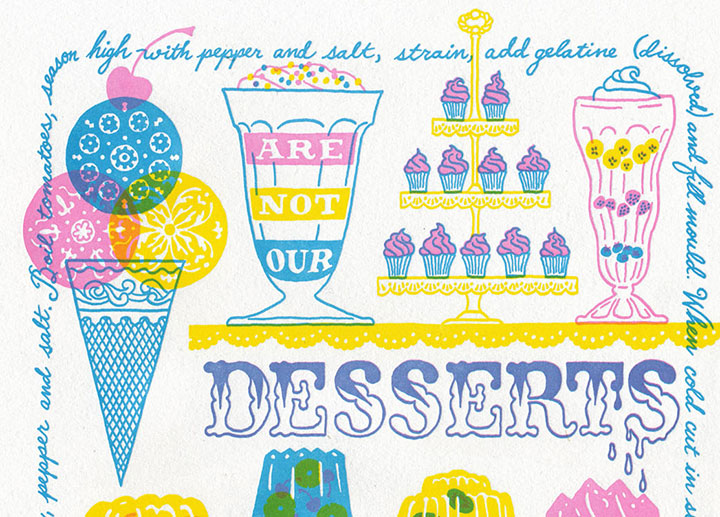
It was our Just Desserts postcard! Jessica and I couldn’t be more proud. So to the new shop, Ice Cream Social: welcome to Tacoma, and thank you for making us a part of the decor!
May 26th, 2014
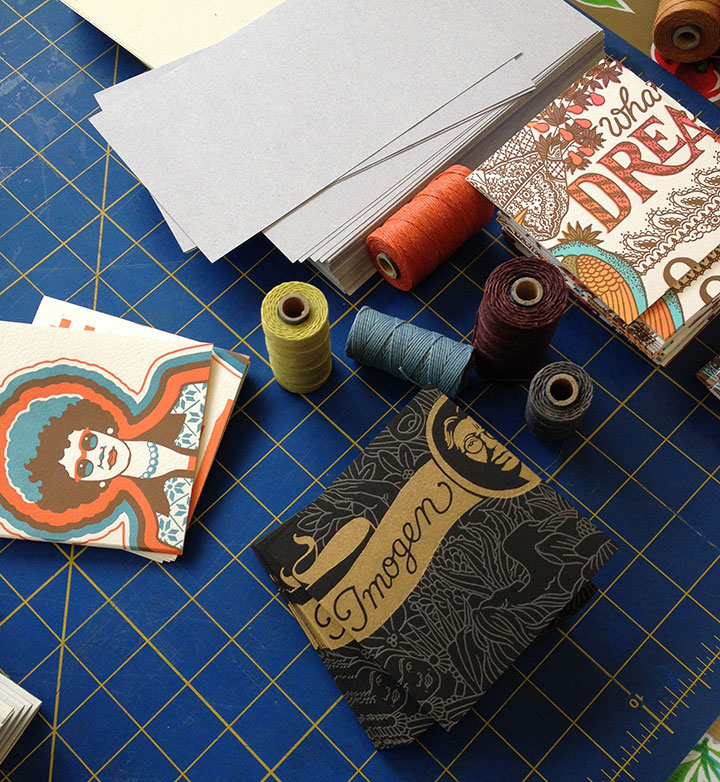
Photo by Jessica Spring
Jessica has been churning out a crop of lemonade journals lately, including some fun new ones from the outtakes of our Focal Point print. Look for them soon in the shop!
March 31st, 2014
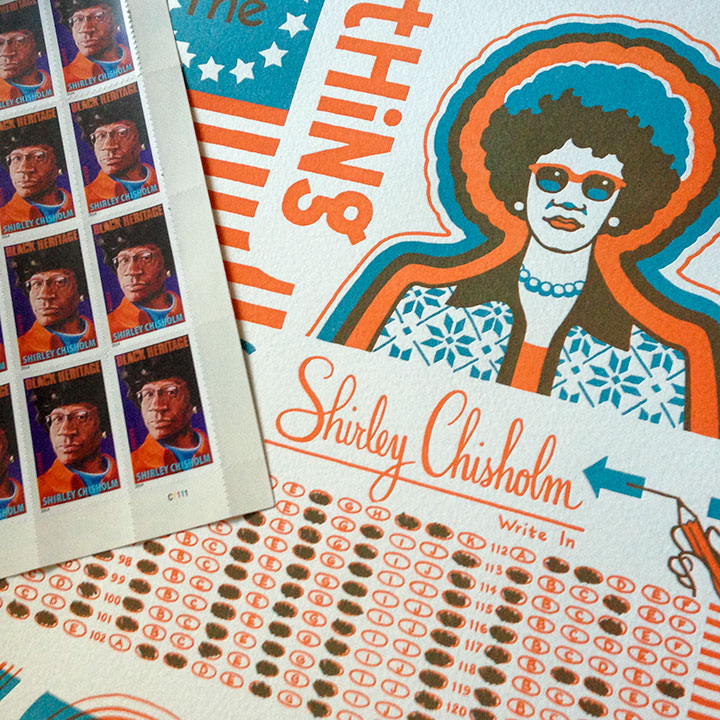
I just picked up a sheet of the new Shirley Chisholm postage stamps—not just because Shirley is awesome, but also because the color scheme matches our Shirley broadside perfectly! (Great minds think alike?)
March 18th, 2014
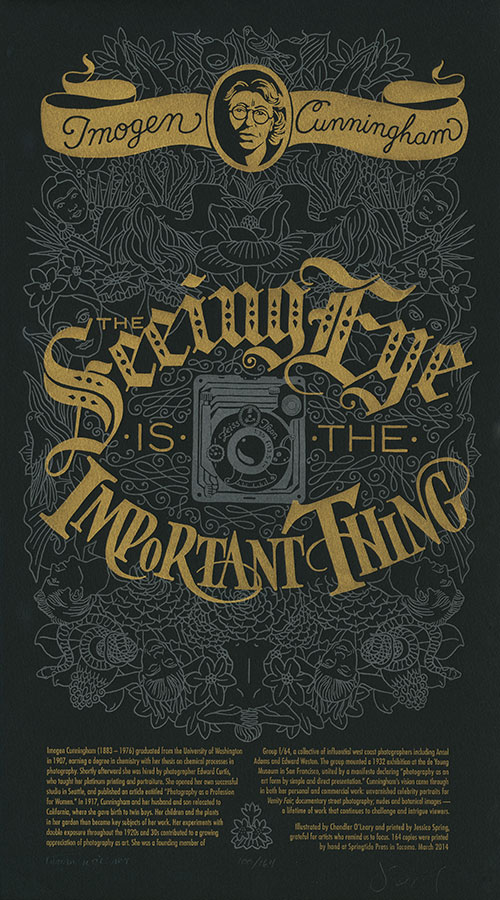
If you earn your living by drawing pictures, you have to spend a lot of time with your head down and your eyes on your paper. Yet at this time of year, with spring coming along fast (at least in the Northwest…), life hurries by at a frantic pace. I hate the idea of missing any of it—so I’m always happy for any reminder to stop and really look around me. So for our newest Dead Feminist broadside, we’re heeding the words of one of America’s greatest photographers:
The seeing eye is the important thing. — Imogen Cunningham
This piece is a major departure from what we’ve done in the past—as you can plainly see. For the first time ever we’ve printed the broadside on black paper—which helped us “pull the focus” (if you will) onto the quote. It also provided a beautiful backdrop for a tribute to someone who spent her life creating black-and-white images.
Surrounding the quote is an intricate metallic silver filigree of spring botanicals and portraiture, creating a pastiche of the subjects of some of Imogen Cunningham’s most iconic photographs—while the color choice references the traditional silver-gelatin photographic process. In the eye of the storm of imagery is the all-seeing camera lens, looking out onto the world.
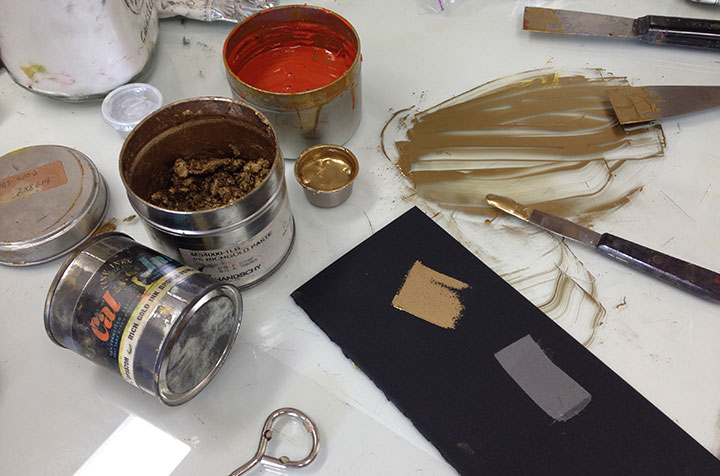
Jessica has her own secret-sauce recipe for gold ink, and while we’ve used it before in our series (like in Gun Shy), nothing makes it look so fabulous as a dark background. The gold ink looked amazing on press—we kind of wished we could just leave the ink on there permanently, because that’s some serious bling. (It almost made the Vandercook feel like some sort of super-cool Bond gadget.)
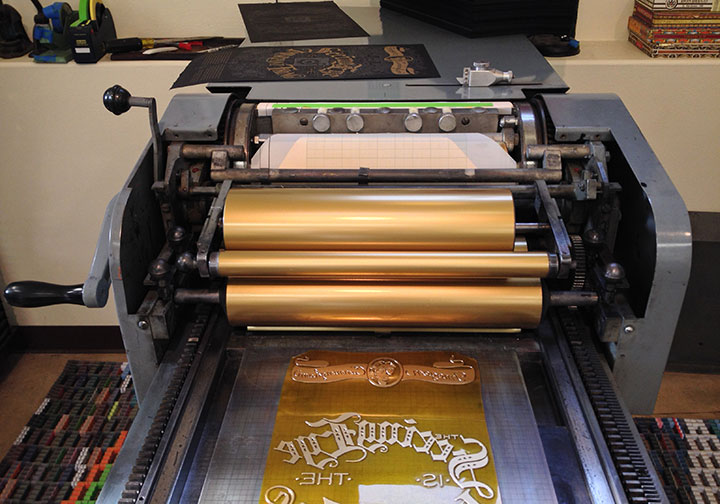
As always, we donate a portion of the proceeds of the series to a nonprofit that aligns with the message of each piece. To help sharpen the seeing eyes of the artists of tomorrow, this time we’ve chosen Youth in Focus — a nonprofit that puts cameras in the hands of at-risk youth to “teach them how to develop negatives into positives.”
• • • • • • • • • • • • • • • • • • • • • • • • • • • • • • • • • • • • • • • • • • • • • • • • • • • • • • • • • • • •
Focal Point: No. 19 in the Dead Feminists series
Edition size: 164
Poster size: 10 x 18 inches
Printed on an antique Vandercook Universal One press, on archival, 100% rag (cotton) paper. Each piece is numbered and signed by both artists.
Colophon reads:
Imogen Cunningham (1883 – 1976) graduated from the University of Washington in 1907, earning a degree in chemistry with her thesis on chemical processes in photography. Shortly afterward she was hired by photographer Edward Curtis, who taught her platinum printing and portraiture. She opened her own successful studio in Seattle, and published an article entitled “Photography as a Profession for Women.” In 1917, Cunningham and her husband and son relocated to California, where she gave birth to twin boys. Her children and the plants in her garden then became key subjects of her work. Her experiments with double exposure throughout the 1920s and 30s contributed to a growing appreciation of photography as art. She was a founding member of Group f/64, a collective of influential west coast photographers including Ansel Adams and Edward Weston. The group mounted a 1932 exhibition at the de Young Museum in San Francisco, united by a manifesto declaring “photography as an art form by simple and direct presentation.” Cunningham’s vision came through in both her personal and commercial work: unvarnished celebrity portraits for Vanity Fair; documentary street photography; nudes and botanical images — a lifetime of work that continues to challenge and intrigue viewers.
Illustrated by Chandler O’Leary and printed by Jessica Spring, grateful for artists who remind us to focus.
Available now in the Dead Feminists shop!
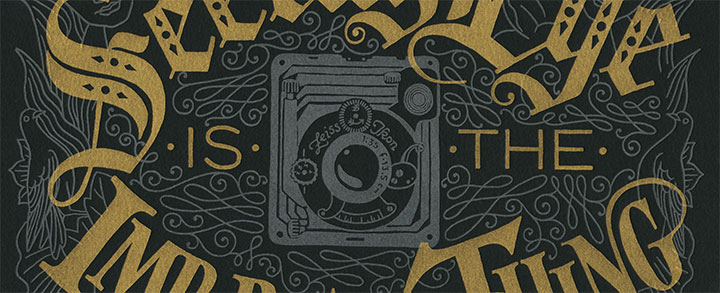
March 13th, 2014
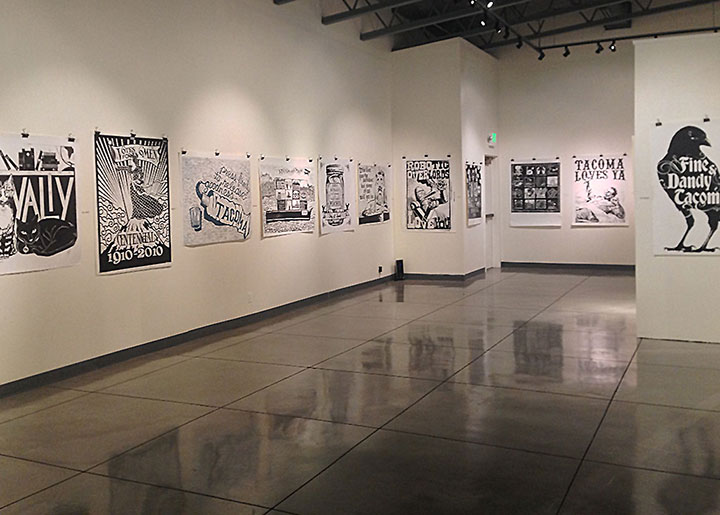
Well, I only just realized that my only photo of last night’s opening (stupid phone!) was so out of focus, but oh well. It still gives you an idea of how nicely the Wayzgoose steamroller prints look on a gallery wall!
Thanks to everybody who made the trek down to Parkland last night for the shindig—and to Jessica Spring for organizing, curating and installing these beasts!
March 7th, 2014
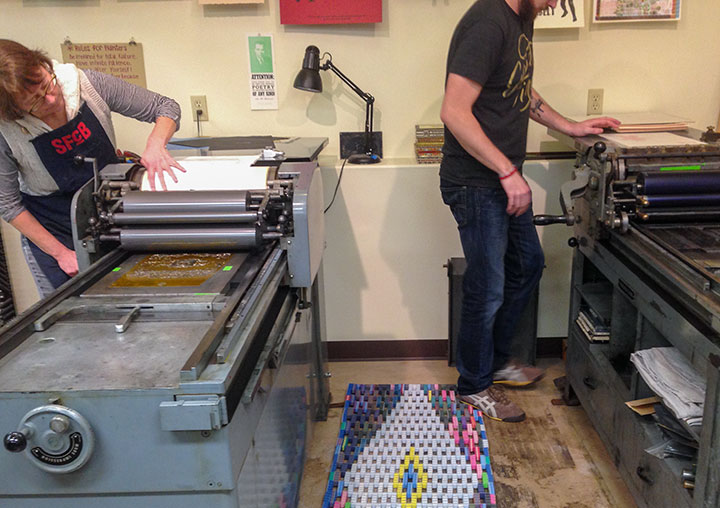
Jessica’s studio is hopping lately. She and I are working on the next Dead Feminist broadside, and our friend R.J. joined us on the adjacent press. There’s just something so satisfying about a room filled with the sound of Vandercook motors humming…

![Chandler O'Leary [logo]](https://chandleroleary.com/wp-content/themes/chandleroleary/images/logo.png)





















